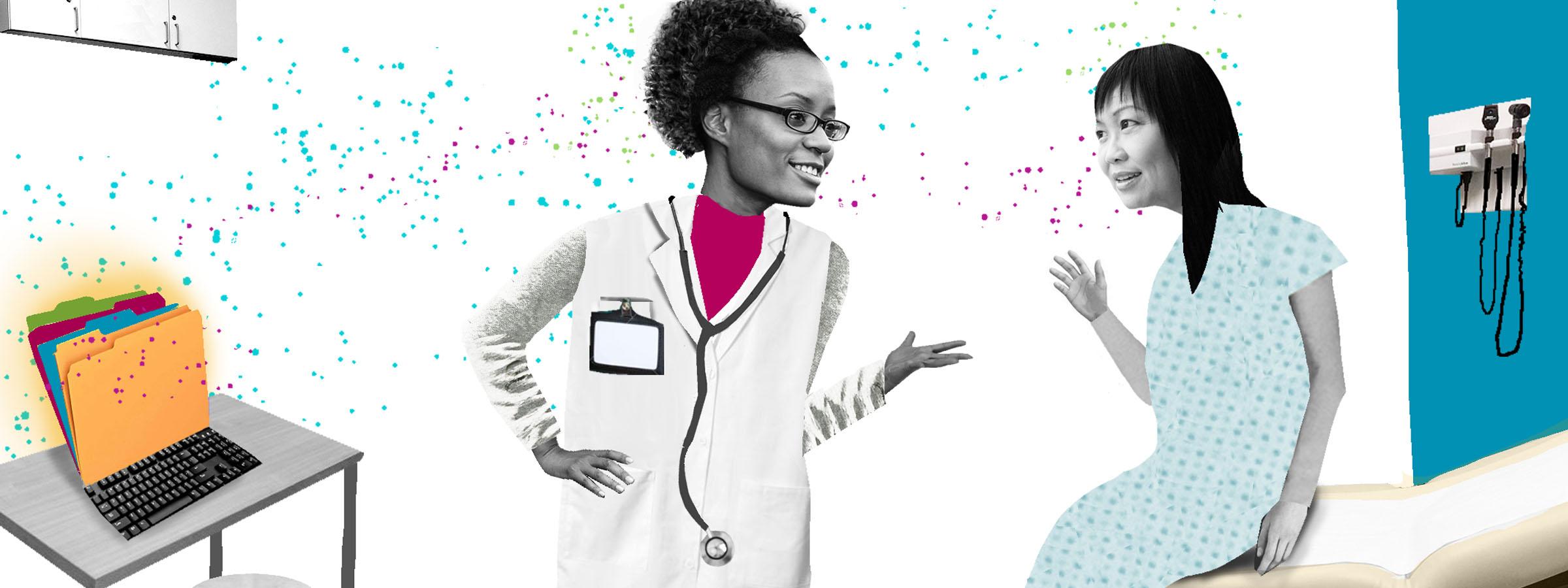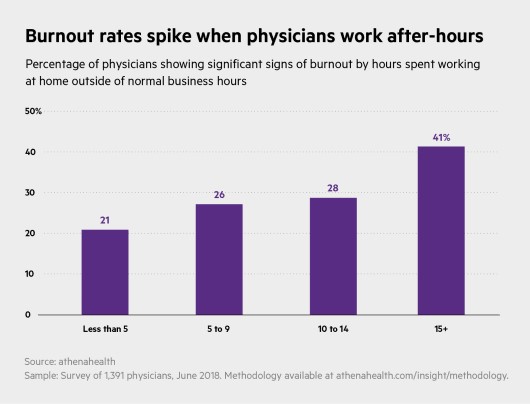Article
AI Medical Scribes Serving as Exam Room Assistants
By Alison Pereto |

According to new data from the athenahealth network, after-hours work on documentation is a powerful driver of physician burnout. In a recent survey, some 37 percent of providers said they spend more than ten hours a week documenting at home outside of normal business hours; data show rates of burnout spike when those hours reach 15 or more.

Steven Esrick, M.D., a family practitioner at Valley Medical in Florence, Massachusetts, squeezes documentation in during lunch. “But mostly, I end up doing it at the end of the day," he says, “or I do an hour in front of the news every night, finishing up notes. It's not a good pattern, and I keep trying to break it, but I haven't been able to."
Voice-activated dictation programs are one solution. “But most [of our] people won't dictate in front of patients," says Esrick. Some physicians are turning to human scribes, but it's an expensive option with a high turnover rate — providers say the scribes tend to move on to medical school or other professions every one to two years.
Enter the AI scribe.
“It never goes on vacation, never goes to med school," says Nathan Gunn, M.D., chief operating officer of Suki, an artificial intelligence-powered, voice-enabled digital assistant that integrates with various electronic health record systems. “It just gets smarter."
Gunn left clinical practice when he realized documentation took more of his time and energy than caring for patients. “It was clear that, as a physician, I wasn't going to be able to [create change] from a clinical perspective," he says. Excited about technology's possibilities to free up providers, he helped form Suki (formerly Robin).
Suki is one of several AI scribes racing towards a wary, weary market, all with the goal of saving practices time. By reducing repetitive documentation tasks and allowing providers to summon X-rays and test results with simple commands, AI scribes might even be poised to restore the physician-patient relationship.
Listening from inside the room
Artificial intelligence has advantages over simple dictation, proponents say.
Listening to conversations between doctors and patients, the machine-learning technology not only creates accurate clinical notes, it constantly updates its own knowledge bank to learn each provider's unique speech patterns, accents, protocols and workflows. It's even attuned to specialties, knowing that an orthopedic surgeon's “AC" is a ligament – not a direction to take medication before meals.
As soon as an early version of Suki existed, Gunn offered it to physicians for a trial. He readied himself for critical feedback. “A wonderful idea won't gain you access to the exam room if you're not saving doctors' time," he says. “If you disrupt the doctor workflow, if you add one minute to the day, you're doomed to failure."
You're more engaged with the patient sitting in front of you. That's a huge win
After just half a day, though, providers in the trial were reluctant to return Suki. And, analyzing nearly 2,000 patient encounters from the trial, Gunn's team found that when using Suki, the average time physicians spent in their EHR during encounters dropped from 4.3 minutes per patient to 1.8 minutes – almost a 60 percent decline.
“If you can save three minutes on any one patient during the course of seeing 40 or 50 patients a day, that's a lot of time," says Michael J. Behr, M.D., medical director of OrthoAtlanta, a orthopedic and sports medicine group with 14 locations in greater Atlanta. OrthoAtlanta is one of Suki's pilot sites — and, according to Behr, his providers are delighted to no longer have “20 charts to dictate" when they get home.
Most important, OrthoAtlanta's providers can now turn their focus to their patients. “You're really more engaged with the patient that's sitting in front of you," says Behr. “That's a huge win."
Alison Pereto is staff writer at athenaInsight.







